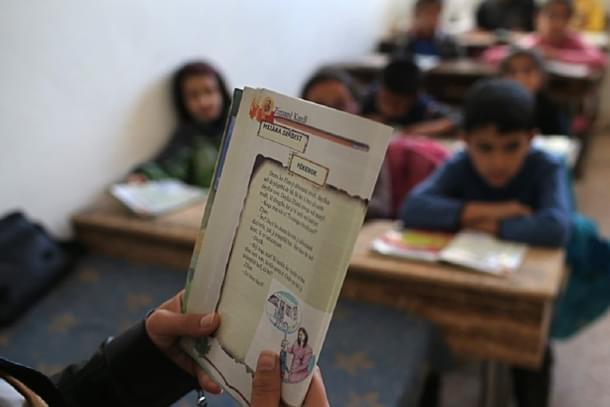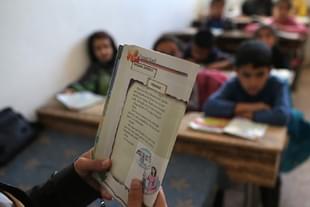Ideas
Karnataka Textbooks Controversy: What BJP Should Do To Build An Effective Counter-Narrative
M Seetharam
May 31, 2022, 11:37 AM | Updated 11:35 AM IST
Save & read from anywhere!
Bookmark stories for easy access on any device or the Swarajya app.


The Bharatiya Janata Party (BJP) government in Karnataka had constituted a textbook review committee some years back under the chairmanship of Rohith Chakrathirtha to review, revise, correct and improve the Kannada and history school textbooks.
The last few weeks have seen a raging debate and controversy around changes that may be introduced based on the recommendations of this committee.
A big chunk of the Indian population, especially the constituencies that back the BJP, has now become aware of the need to correct and ‘detox’ textbooks that have been crafted by the Marxist intellectuals for many decades.
However, the legacy influence and entrenched power networks of those opposed to these essential changes are both a formidable and a predictable obstacle on this path. The events that are unfolding and continue to unfold in Karnataka are hence important to draw some quick lessons for those who want to challenge the Leftist/Marxist hegemony in this domain.
Unapologetic And Motivated Misinformation
This round of controversy was kicked off on the basis of a deliberate lie and misinformation that the textbook committee was replacing a lesson on Bhagat Singh with a lesson on K B Hedgewar. This was quickly followed up with equally malicious lies that the lessons on the reformer Narayana Guru, philosopher Swami Vivekananda were dropped in favour of a few lessons on or written by Brahmins.
All these lies were refuted by the chairman of the review committee and by the minister. But the campaign of lies had succeeded in creating a cloud of controversy and putting those labouring for it on the backfoot.
Realistic presentation of Tipu Sultan and Periyar as opposed to their larger-than-life presentation in the previous version was also flagged by the status-quoists, but they were perhaps not as damaging to the efforts of the committee and the government.
It is obvious that these falsehoods were spread to create suspicion and deepen the divisions within the Hindu society. A frivolous and harmless take (from many years ago) on the state song of Karnataka was deliberately twisted to make it appear as thought it was intended as an insult to the great poet Kuvempu — and on all Vokkaligas.
A few Kannada writers aligned with Siddaramiah have resigned from a few government bodies in protest. These writers have referred to Okkuta Vyavasthe (India as Union of states) and Kuvempu’s poem which imagines Karnataka maate (mother) as a daughter of Mother India in their letter of resignation. This contradiction seems to have missed the attention of these idealogues.
Poor PR Strategy, Lack Of A Counter-Narrative
Textbook review and revision — especially of Kannada and history; cannot be imagined as an apolitical and a purely intellectual endeavour. Have we forgotten the ferocity with which the Marxist intellectual ecosystem fought off similar efforts by Murali Manohar Joshi? The chairman of the review committee, the minister in-charge (B C Nagesh) and the Karnataka BJP government — all seem to be completely unprepared for this onslaught by the combined forces of Congress and Marxist intellectuals (Janata Dal Secular joined later as cheerleader).
Karnataka is headed for elections early in 2023 and the political climate in the state has been red hot for many months now. Hence, shouldn’t those vested with the power and authority to see this effort to fruition have expected, prepared and kept the initiative on this issue? It certainly didn’t seem that way to a concerned lay observer like this author.
Ideally, they should have systematically brought dangerous lies, shortcomings in the existing textbooks to mainstream public attention much before and stayed on the front-foot. Instead, we only heard of these as a foot-note in the response offered to the current allegations.
Chakrathirtha has been calm and formidable in his utterances and TV appearances, but it is true that his name and standing did face an extreme scrutiny and damage. While the minister in-charge did dig his heels in and back Chakrathirtha by nominating him to the PUC (Class XI and Class XII) textbook review committee, some of the errors in his response did lead the government to face more uncomfortable questions.
While everyone from Siddaramaiah, H D Kumaraswamy and a long list of Kannada Marxists/status-quoists lined up to malign this review effort and Chakrathirtha personally, no one of comparable position and heft responded from the BJP. Apart from Chakrathirtha, no other members from this committee too were heard vocally defending their recommendations.
State BJP and the Karnataka government were much better prepared and represented in the media in the recent hijab controversy — which makes it amply clear that it is not a question of incompetence as much as deliberate neglect of this issue when it comes to allocating resources and priority.
Silos And Breakdown Of Networks In Right Wing And Hindutva Circles
The Indian non-left, Right wing and Hindutva forces have certainly grown, matured and become more capable when it comes to standing up effectively for their issues and truths. They have certainly managed to win many more battles than lose in the national stage at least. But, this episode in Karnataka has more than exposed the weakness in their frontlines.
Let us talk about some of the successes. The Kashmir Files was well defended and backed up by the voices in government, industry and intellectual circles. Vikram Sampath’s book on Savarkar was well presented and the malicious attacks against the author and Veer Savarkar too dealt with effectively by all the voices. The hijab episode (which too originated in Karnataka) was managed well in both the English and Kannada media.
However, the issue of text books review has remained restricted to the Kannada media and Karnataka circles. It hasn’t become a national issue in the English language media. Those opposing the changes are responding in the same manner and force as they did during the hijab issue, but the response from the BJP (all units), intellectual and other influential voices has been nowhere close to what this issue merited.
Think about this — as this issue was burning in the Kannada media, some of the most influential voices of the non-left/Right wing circles were right in Bengaluru for the India Foundation’s conclave and this author didn’t come across any comments/statements by the speakers there on this topic.
This comment must not be mistaken as a criticism of the conclave or its speakers. It is just an observation that perhaps there are silos in this circle with no interconnections. There are many celebrated writers, speakers from the state of Karnataka in that list — were they too uninformed about these developments? Or did they choose not to hitch their name with a policy which appeared to be on a tough wicket?
There is no cost to re-tweeting the tweets by the Prime Minister, but defending crucial policies of government needs one to do some homework. Winning elections and forming governments is only a first and essential step to bring about meaningful changes. Without careful, co-ordinated and deliberate push — I am afraid we will continue to stumble and fall each time we touch these areas of policy.





